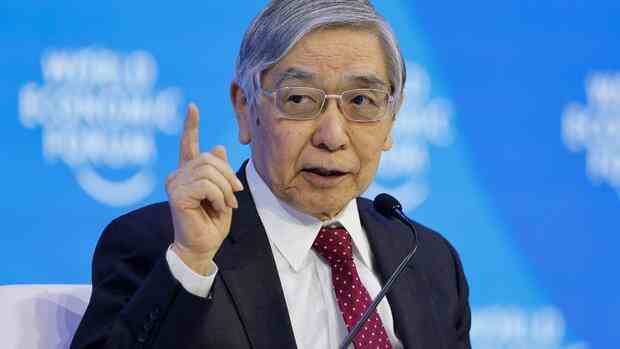Tokyo Japan’s financial sector is facing the most important personnel decision in the past ten years. This week, the Japanese government will nominate two deputy governors and a successor to central bank governor Haruhiko Kuroda, who launched unprecedentedly easy monetary policy in 2013. His second term ends in April, that of his deputy even in March.
Hedge funds see the personnel as an opportunity for a monetary policy paradigm shift. So far, the Bank of Japan is the last major central bank not to raise interest rates. Instead, it relies on so-called yield curve control, which it uses to control the yield on ten-year Japanese government bonds (JGB).
The BoJ had long stipulated that its interest rate could fluctuate 0.25 percentage points up and down around zero. It left interest rates on longer-dated bonds to the market. With this, the monetary authorities wanted to keep JGB trading alive, even though they are increasingly dominating the market. Because life insurers and banks need the JGBs for their balance sheets.
However, since the US Federal Reserve raised interest rates to fight inflation, it has become increasingly difficult to defend the low ceiling of the trade corridor. In December, Kuroda surprisingly gave way and doubled the upper and lower interest rate limits to 0.5 percent. Since then, speculation about an end to yield curve control or even a move away from the zero interest rate policy has increased drastically.
One candidate to succeed Kuroda is his current deputy, Masayoshi Amamiya. If Prime Minister Fumio Kishida were to nominate him, market reactions would be pro-business, expects Masamichi Adachi, UBS economist. The yen could depreciate, interest rates fall, stock prices rise. Because Amamiya is considered a representative of a slightly changed status quo.
Yield curve control is on the brink
Markets were already rehearsing this reaction on Monday. After media reports that Amamiya was specifically being discussed as Kuroda’s successor, the yen fell to a three-week low and was quoted at 131.95 against the dollar on Monday morning.
>> Read here: Markets bet on end of ultra-loose monetary policy in Japan
The central banker is one of the architects of Kuroda’s monetary policy, defending the policy of low interest rates and the massive purchases of government bonds, mutual property funds and exchange-traded stock index funds (ETFs) that have made the central bank Japan AG’s largest shareholder. However, he said last year that the Bank of Japan must always consider how to exit ultra-loose monetary policy.
The number two candidate is former central banker Hiroshi Nakaso. Due to his role during the global financial crisis, he is considered an experienced crisis manager with excellent global connections. In addition, he already choreographed an exit from the then ultra-loose monetary policy in 2006 and published his ideas for a second exit in May 2021 in a book.
His plan is to first remove yield targets for 10-year JGBs, then raise short-term interest rates and finally reduce the Bank of Japan’s balance sheet. The markets would therefore expect him to be more willing to make political changes – but not as strong as the third candidate, Kuroda critic Hirohide Yamaguchi.
Your appointment would certainly signal a departure. Stefan Angrick, Senior Economist at Moody’s Analytics on Sayuri Shirai
Economist Adachi is certain that if Yamaguchi is nominated, the reaction will be rather restrictive. The yen and interest rates could rise, the share prices of export companies fall.
Observers do not believe in a radical break
Other people are also traded, including several women like former Bank of Japan Monetary Policy Committee member Sayuri Shirai. She is now an economist at Keio University.
“She says what she thinks,” says Stefan Angrick, senior economist at Moody’s Analytics in Tokyo. He knows Shirai from their time together at the Economic Research Institute of the Asian Development Bank (ADB). “Your appointment would certainly signal a departure.”
Nevertheless, Angrick does not believe that she would advocate an immediate departure from the zero interest rate policy. “She is a very good economist and knows that there are certain requirements.”
Irrespective of the personnel, economists do not see the time for a radical turnaround in interest rates in Japan as yet. The inflation rate there is also rising to around four percent. But the price increases are due to the import of expensive raw materials and food, on which Japan is much more dependent than Germany.
Domestic demand remains weak, as does wage growth and the recovery from the corona crisis, says Angrick. “Unlike the US, the Japanese economy is still below pre-pandemic levels,” he explains. In his opinion, the monetary watchdogs will only start discussing higher interest rates when the central bank can observe significantly higher wages this year and next.
“It is clear that with interest rates rising and the yen already far too weak, the government needs to tackle more fundamental reforms,” said Martin Schulz, chief economist at Fujitsu and a member of the Japanese government’s Expert Council on Economic and Fiscal Policy. And that’s what Premier Kishida wants too.
“At the same time, interest rates must be kept as low as possible because of the high level of national debt,” says Schulz. “The next head of the central bank will have to take a very difficult middle ground here.”
More: Relaxed monetary policy, high-spending tourists – Japan is hoping for rising share prices
